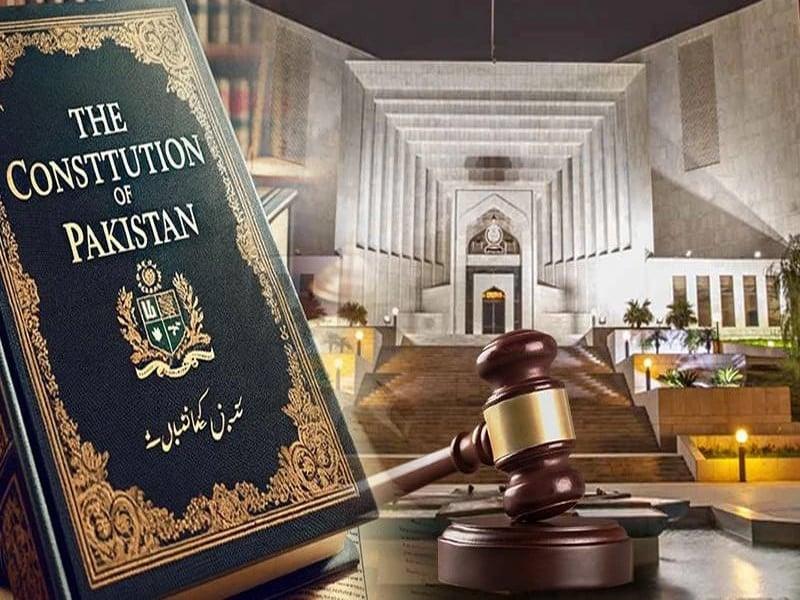Islamabad:
After the approval of the 26th constitutional amendment, adhyocism seems to be growing in the superior judiciary.
Despite the four -month period, the Judicial Commission of Pakistan (JCP) has not yet gathered a meeting to appoint permanent chief judges for the Sindh Superior Court, the Superior Court of Peshawar and the Superior Court of Islamabad.
The Superior Court of Baluchistan also remained without a permanent president of justice for more than three months. On May 19, the JCP approved the appointment of Judge Muhammad Ejaz Swati as the president of the Supreme Court of BHC, but only for a period of two weeks. He retired on June 5.
Judge Rozi Khan Barech, who took second place in the BHC antiquity list, has now been appointed President of the Interim Justice.
Similarly, Judge Sardar Sarfraz Dogar has served as president of the Superior Court of Islamabad during the last four months. His age is currently under challenge in the Supreme Court. While litigation can explain the delay in appointing a permanent president of IHC, there is no clear reason for prolonged delay in appointments for the other three superior courts.
Since the approval of the amendment 18, the JCP has not previously delayed the process of appointing permanent chief judges for the higher courts.
According to the new constitutional agreement, the Executive has a dominant role in the appointment of judges for the Superior Judiciary. However, the superior judges, particularly the president of the Supreme Court of Pakistan, have not made a serious effort to restore the balance in the appointment process.
During the mandate of the current CJP, Judge Yahya Afridi, approximately 50 judges have been appointed for the superior courts, and the executive plays a key role in the nomination of many of them. No judge can now become a president of permanent justice without the support of the Executive.
Therefore, the Government has managed to keep interanos “of related ideas” in the key internal courts.
With the support of former CJP Qazi Faez Isa, the Government managed to raise Judge Malik Shahzad Ahmad Khan of the Superior Court of Lahore to the Supreme Court, according to the reports, because it was not his preferred option to lead the LHC.
At present, the Executive is reluctant to raise the head LHC CJ Alia Neelum, since it is said that the Punjab government feels comfortable with the current provincial judiciary.
It was also learned that the Executive remains undecided regarding the appointment of a President of Permanent Justice for the Superior Court of Sindh.
“It is the PPP that will decide on the permanent president of the Supreme Court of the SHC,” added a source.
The reports suggest that PPP’s legal minds are divided into the nomination for the next SHC president.
Similarly, Judge Syed Mohammad Attique Shah, who was the second in the list of seniority of PHC judges, has been appointed president of the Superior Court of Peshawar. The appointment of a permanent PHC president is being delayed for known reasons.
The lawyers are increasingly vowels about contempt for PHC and BHC Puisne’s judges in the appointment of interim chief judges.
You learn that the PHC judge, Judge Ejaz Anwar, is not in the good books of powerful circles. Therefore, despite his age, he was not elevated to the Supreme Court or was appointed President of the Interim Justice.
The same applies to Judge Muhammad Kamran Khan Mulakhail, who, although appointed as an interim president, could not ensure the authorization of powerful circles. Reports also suggest that he is a victim of judicial policy, and their relations with some higher judges are not cordial.
The current situation indicates that it is unlikely that both higher judges will be appointed as main permanent judges of their respective superior courts.
The lawyer Abdul Moiz Jaferii commented on Islamabad, saying: “It is a way to continue the farce that is the new Dogar court. There are a lot of good judges there, so we maintain that everyone is hung and distracted.”
Talking about Sindh, Jaferii added, it has the effect that a perpetual carrot hangs before the highest judges in the province.
“Let’s see what you can do to please us, without really asking you to do something specific. Keeping the empty corner court, keep everyone in the race. And when you don’t know what you are running or how long is the race, you start running cautiously. That’s good. And it’s exactly what they want.”
The lawyers believe that the upper judges, who are in charge and the beneficiaries of the 26th amendment, must take measures to restore the institution, whose independence has been compromised during the last six months.




